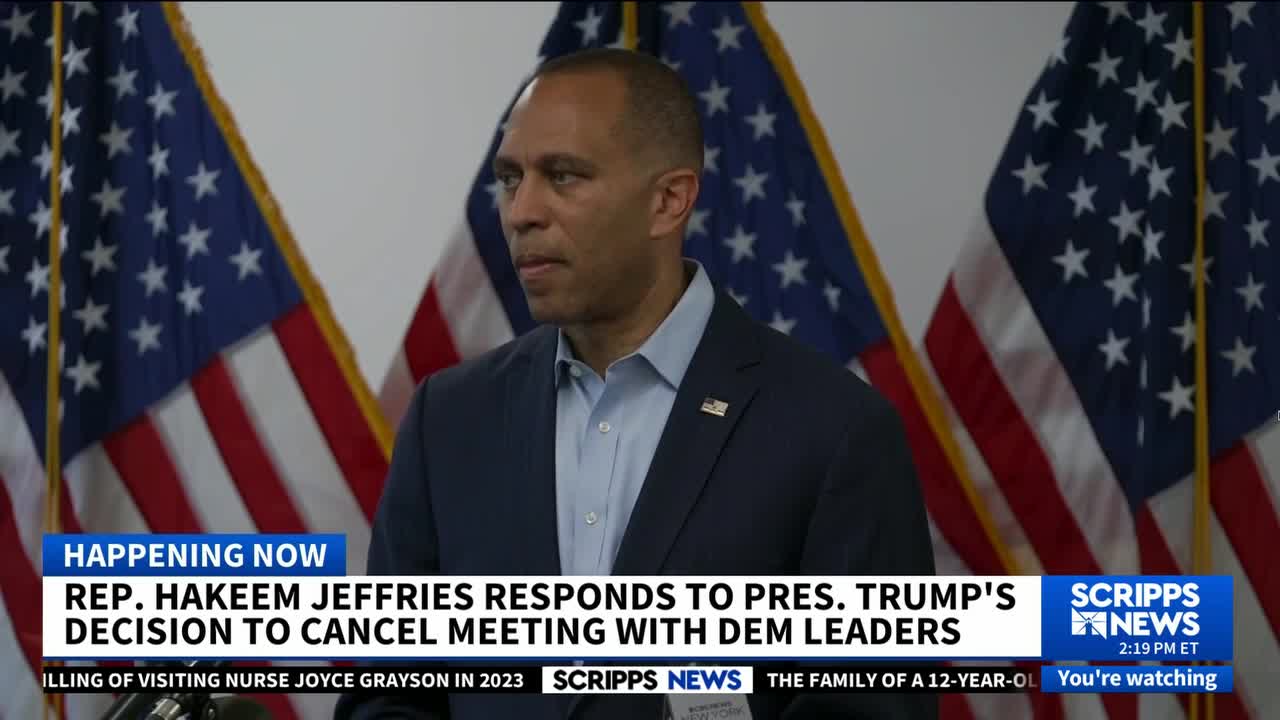President Donald Trump has abruptly canceled a planned meeting with Senate Minority Leader Chuck Schumer and House Minority Leader Hakeem Jeffries ahead of a potential government shutdown.
In a lengthy post Tuesday on his Truth Social platform, the president rejected to meet with the Democratic leaders at the White House, saying "unserious and ridiculous demands" are being made by the "Minority Radical Left Democrats" to fund the federal government when the new budget year begins on Oct. 1. If lawmakers are unable to come to an agreement by that date, the government will shutdown.
"I look forward to meeting with them if they get serious about the future of our Nation," President Trump wrote. "We must keep the Government open, and legislate like true Patriots rather than hold American Citizens hostage, knowing that they want our now thriving Country closed."
"To the Leaders of the Democrat Party, the ball is in your court," he added. "I look forward to meeting with you when you become realistic about the things that our Country stands for. DO THE RIGHT THING!"
RELATED STORY | Senate rejects competing bills to fund government, increasing risk of shutdown
Earlier Tuesday, Schumer and Jeffries shared a joint statement saying the president had finally agreed to meet with them after "weeks of Republican stonewalling." After the meeting was canceled, however, the Schumer accused President Trump of "running away" from the negotiating table, with Jeffries adding that "Trump Always Chickens Out."
"While Americans face rising costs and a Republican healthcare crisis, Trump would rather throw a tantrum than do his job," Schumer said in a statement. "Democrats are ready to work to avoid a shutdown — Trump and Republicans are holding America hostage. Donald Trump will own the shutdown."
"The extremists want to shut down the government because they are unwilling to address the Republican healthcare crisis that is devastating America," Jeffries added.
Congress narrowly passed a six-month spending bill in March to fund the federal government, despite sharp Democratic opposition. But with lawmakers on both sides of the aisle again at a stalemate, time is running out before a funding lapse ensues on Oct. 1.
IN CASE YOU MISSED IT | Senate passes six-month funding bill hours before shutdown deadline
A potential government shutdown, however, won't affect everyone the same way. There are essential workers, whose jobs must continue, and non-essential jobs that would pause for the duration. But the American public would see the effects of both.
U.S. Postal Service operations, for example, would continue during a shutdown. Most of TSA's workforce is also considered essential, so security screenings at airports would also continue.
National Parks, meanwhile, would remain open, but without staff to look after maintenance. In past shutdowns, the National Park Service warned trash was likely to pile up while staff were furloughed.
Federal employees who are furloughed would feel the most direct impacts of a shutdown. In 2018, when the government shut down, many local workers had to lean on Washington, D.C. food banks when their paychecks stopped.
Furloughed workers receive back pay when furloughs end, but the slowdown in the government's far-reaching services can still add up to billions of dollars in costs. A shutdown may also delay everything from DOJ prosecutions to small business contracts and IRS processing for new mortgage applications.




